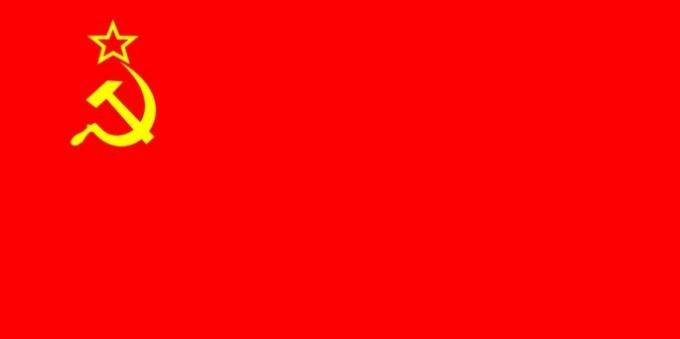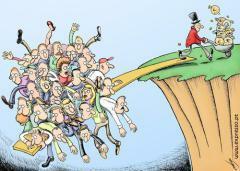Communism is a political, social and economic ideology contrary to capitalism, in which an egalitarian society is established.
The concept of communism refers to a society in which there is no private property and, consequently, no social classes or the need for a state.
Thus, constant peace and security would be achieved through production aimed at people's needs, no longer in line with the market as in capitalism.
In the words of Karl Marx, the main theorist of communism:
From each according to his capacity; to each according to their needs.
That is, in a communist society, each person would work according to their abilities and aptitudes and everyone would receive according to their needs.
Characteristics of Communism
The characteristics of communism are:
- abolition of private property - everything belongs to everyone and is distributed according to needs;
- collectivization of the means of production - industries, machines, technology, etc. everything belongs to the community;
- collectivization of production - there are no goods, only products that are not sold, but distributed according to the needs of each person;
- end of class struggle - there is no antagonism between a ruling class and an exploited class;
- classless society - without the circulation of capital, there is no profit or accumulation, therefore, there is no distinction of status between citizens and the formation of social classes;
- extinction of the state - after the period of organization and education of the citizens, the State loses its function and the collectivity becomes self-regulated;
- internationalism - the system needs an international adhesion that takes into account the different production capacities. With the absence of the State, borders also lose their meaning and cease to exist.
What is the difference between socialism and communism?
Socialism refers to a structure in which the inequalities responsible for the genesis of social problems, such as violence and poverty, would be systematically abolished.
Socialism begins with a phase called the "dictatorship of the proletariat, a period in which social classes are still maintained, but under the command of the working class.
This period would have as objective the adaptation of the people to a new system, without property and without exploitation. Changes in the mode of production would put an end to the alienation of work.
Thus, without the expenditure of energy with the class struggle and the effort used for survival, work would once again become a humanization tool.
This change in the mode of production would start a period of extreme production and abundance, meeting everyone's needs.
Thus, socialism would be responsible for overcoming the capitalist system and the transition to a classless and fully egalitarian society, communism.
Communism can be considered as the final stage of socialism. It would happen the moment the state was extinguished. Thus, a society would emerge in which wealth was equally divided among all those who contributed their productive force.
Finally, it is worth noting that modern communism is identified with communist parties. They are based mainly on the Marxism, in Marxism-Leninist, in Marxist Maoism, both of these doctrines aimed at equality among the majority.
Know the Differences between Communism and Socialism.
The Origin of Communism
Marxism was not, as is thought, the origin of communism. Other previous authors sought to think of alternatives for a fairer and more egalitarian society.
Marx himself was guided, in part, by the experience of Paris Commune, a proletarian government established in the French capital in 1871. The Paris commune was the first model of socialist government in history.
Plato (427 a. C.-347 a. C.), in your text "the republic”, describes a society in which people would share all their possessions and the upbringing of children would be a collective responsibility. Therefore, a system without private property or families.
In the 16th century, with the rise of the mercantile bourgeoisie, other criticisms arose in relation to medieval values. As an example, we can mention the work "Utopia”, by the British philosopher Thomas More (1478-1535).
However, this idea gained substance as a theory with the criticisms of private property, during the 18th century, with thinkers such as Jean Jacques Rousseau (1712-1778).
However, with Karl Marx (1818-1883) and Friedrich Engels (1820-1895), the founders of "scientific socialism", that we will have the modern configurations of communism.
What does it mean to be a communist?
Within the so-called ideological political spectrum, communists as well as anarchists are on the far left.
The works of Marx and Engels, such as The capital and The Party Manifesto Communist, influenced the creation of communist parties around the world, having some adaptations and giving rise to socialist experiences in several countries, such as Leninism (Russia) and Maoism (China).
Although no country has reached the communist stage, throughout the 20th century, several countries adopted the so-called communist regimes.
Some of the countries that assumed a Marxist (communist) orientation were:
- Russia/Union of Soviet Socialist Republics (USSR)
- Oriental Germany
- China
- Cuba
- Vietnam
- North Korea
the symbols of communism
The main symbol of communism is the hammer and sickle, usually yellow on a red background, the color that represents communism. The sickle represents field workers, while the hammer is associated with urban workers. The five-pointed red star is also a symbol of communism.

The color red is traditionally used by communist parties and is also a representation of the ideological spectrum. Therefore, communists are often also called "red".
Communism in Brazil
In Brazil, the Brazilian Communist Party (PCB), the "partidão", founded in 1922, was the first to be influenced by the Communist International and by the movements of Brazilian workers, above all, the general strike of 1917.
During much of the Republic's history, communist organizations were relegated to the underground, especially during the period of the Military Dictatorship (1964-1985).
After redemocratization, some political parties are influenced by communism. In addition to the PCB, acronyms such as: PCR, PSTU, PCdoB, PCO, PSOL, PPS, PSB, PT and PDT have, to varying degrees, some kind of alignment with Marxist thought.
Some Brazilian personalities openly communist:
- Carlos Marighella
- Candido Portinari
- Florestan Fernandes
- Graciliano Ramos
- Jorge Amado
- Leandro Konder
- Leci Brandão
- Luís Carlos Prestes
- Nise da Silveira
- Olga Benário Prestes
- Oscar Niemeyer
- pay
- Paulinho da Viola
- Rachel de Queiroz
- Zelia Gattai
understand more:
- Capitalism
- Socialism
- Anarchism
- Atheism
- farc
- Ideology
- capitalist mode of production
- Questions about Karl Marx



